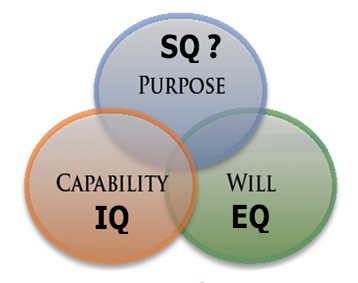Is there a space for Spiritual Intelligence (SQ) for leaders in a corporate environment

 Is Spiritual Intelligence the next level?
Is Spiritual Intelligence the next level?
Is there a place for it in the corporate environment?
What are the benefits to an organisation in acknowledging this agenda?
Paul Chippendale from Minessence,net defines SQ as “The intelligence with which we address and solve problems of meaning and value, the intelligence with which we can place our actions and our lives in a wider, richer, meaning-giving context.”
Cindy Wigglesworth from Deepchange.com has a different definition: “the ability to act with wisdom and compassion, while maintaining inner and outer peace, regardless of the circumstances“
From a purely spiritual perspective I find myself a little uncomfortable in using the word intelligence to reflect a feeling or awareness of something that somehow sits above and around an organisation. The Oxford dictionary defines intelligence as “The ability to acquire and apply knowledge and skills”. Do we acquire our spirituality or do we become aware of it?
In the arena of spiritual development I would argue that, over time, we raise our awareness and understanding of what spirituality means to us. From this raised awareness we create or adapt our beliefs, values and behaviours. By using the word intelligence are we trying to use a ‘thinking’ word to describe a ‘sensing’ process?
Maybe getting stuck in the semantics takes us away from the central issue of whether an awareness of the spirit of an organisation is useful. My previous post sets out my belief that understanding and acknowledging your company spirit can have benefits to staff motivation and retention, but what about the bottom line – the one measurement that all corporate organisations use as a gauge of success or failure?
I have every confidence that any organisation, or a single line of business within a larger organisation, will be more successful at every level – including profitability when it becomes more aligned to its spirit and purpose and makes the necessary changes to embed the new values across the department or organisation. More importantly this way of authentic working will lead to on-going success because both product and people development will be improved and sustained.
Can this be measured? With the right processes in place to ensure that behaviours and attitudes across the organisation are consistent, and all products and services are aligned with the values and ethos, measurable improvements will be identified. Staffing and recruiting costs will reduce, customer retention and loyalty will improve and ultimately profitability will increase in a sustainable way.

Leave a Reply